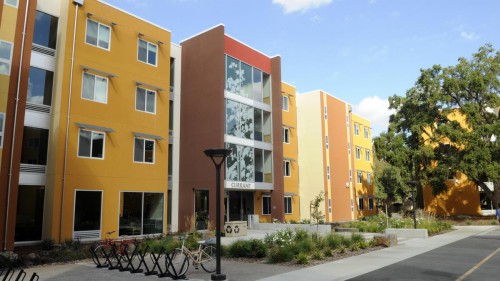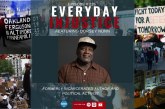
The students told the Vanguard that they are frustrated at being treated like pawns by the university and the city, who are pointing the fingers at each other over housing issues, when it is students caught in the middle that pay the ultimate price of unaffordable housing or cramming in several to a bedroom.
The students also pointed out that, while it is relatively easy to show up on a Tuesday night to advocate for a housing project, dealing with the university is a longer term process and they lack the labor or time to be able to have sit ins in Mrak Hall to demand changes to the LRDP (Long Range Development Plan) that they may not impact – and even if they did it wouldn’t be felt until years down the line.
For over a year and a half, the Vanguard community has been discussing the issue of student housing, the LRDP and the low housing vacancy rate. With some notable exceptions, however, that conversation has not involved UC Davis students.
On Friday, the Vanguard had an hour-long interview with three student leaders. Daniel Nagey is an ASUCD Senator, Sara Williams is the External Affairs Commission Chair, and Georgia Savage is the director of the Office of Advocacy and Student Representation (OASR).
Due to the length of the interview and volume of material, I have broken the article into two parts. In the first part we discussed on-campus housing and affordability concerns, and now in the second part we discuss the LRDP and off-campus housing.
The students summarized their view of on-campus housing by noting how much time they spend on campus, and that often the only time they get into the community is when they are looking for housing.
Sara Williams made the point, “We have been talking about how students would prefer to live on campus, but I really don’t want to go as far as to say that we would love to live there for all four years because you realize how much connection comes from us moving into the community and because a big reason this community thrives in the way it does is because of student involvement… and students being all over the city.”
Sara Williams said that, with regard to the university’s LRDP, “they need to at the very least house the growth that they are bringing to campus. That makes no sense to me – right now the housing situation in Davis is not good, it’s just not.
“But what I will say is that students, like always, we acclimate to things,” she said. “We’re finding a way to figure it out. I’m not saying that’s a good thing.”
Right now, she sees the city as able to be bringing in some housing project “that will bring at least some relief to us. I’m feeling okay about that – not good – I want it to increase, but okay.”
But, she said, the current city situation with added incoming students “that the campus refuses to house, that’s when it literally becomes an issue of people having three or four to a room (that should be) a one person room.” She said that then it becomes an issue of safety.
“That is what I want so badly for the university to step up on – housing 100 percent of the growth that they see in the long range development plan,” she added.
Daniel Nagey said, “That’s what we want to see, at least 50 (percent of the students on campus) if not more. I think most schools (house) anywhere from 100 to like 60 percent and we are probably at the very low end of (housing on campus).”
Georgia Savage pointed out, “The relief has come from the city – it has not come from the school. And the receptiveness to the looming problem of student homelessness, and the response to that, has largely been from our city versus the school (with which) we have also had these meetings and (are) pressuring.”
Sara Williams explained that they have been in multiple meetings with campus planning officials who are working on the LRDP. “We’ve had discussions about these things but it’s never come with any actionable items.
“They do give us a sense that they’re listening – it’s just that we never see anything come of those conversations,” Sara said. “We’ve been talking about this since fall.”
ASUCD has authored some resolutions that have pushed for both the city and university to step up, and asked for the university to provide 50 percent of students with on-campus housing options.
Sara Williams said, “The process is different for us pressuring the university versus pressuring the city because of the nature of the way that projects come to the city and the nature of the way projects come to our administration.
“We can’t use the same tactics on the administration that we do the city,” Sara continued. “I see a lot of people saying, why don’t they sit-in on Mrak… People seem to forget that we have lives – like we can spend our labor hosting sit-ins every day.” She called the notion “hilarious” and said, “We can’t.”
She pointed out that she has four jobs, but others have multiple jobs in addition to being full-time students. “We don’t have the time to host sit-ins all the time, but what we can do is spend a Tuesday night at city council,” she pointed out. She said they can also send emails to the city council.
“We don’t have the labor there to pressure administration in the same way that we can show up to a city council meeting,” she said. She also added, “We know that we can form these relationships with admin in a way that we can’t necessarily form these relationships with city council.”
She pointed out, “Admin technically have to respond directly to students.” The city has a number of other constituents that they have to worry about. “We take that very seriously and we like to come to the table as equals.”
Sara Williams said they are two different arenas and they require different tactics. “We have things planned and we’re excited about it, and we’re not planning on stopping any time soon as the pressure is concerned with the LRDP.”
Georgia Savage made a similar point, “The LRDP moves monumentally slower than city projects.” With a city project, the project comes forward, they talk with community members, the council approves it. “That’s not how the LRDP works,” she said. “It’s not like there’s one vote and everything is approved.”
They feel like the university has made some minor tweaks in response to student concerns. For instance, on the Russell fields issue, “As students we definitely do want more housing, but we don’t think that should impose on current activities and current lives of the students now.
“Students shouldn’t have to give anything up, in my opinion, for more housing to be built,” Georgia stated.
She said, “For us, building those relationships is better to us than making every meeting a hostile meeting.” “This is such a long process that the hostility would be over years,” she added.
Sara Williams added, “With the LRDP that’s not concrete. The projects we support at the city level… those are concrete units that we can count. Those are units that are student oriented. Whereas the LRDP, that’s aspirational.”
Even if they agree to the 100/50, “that’s aspirational, that doesn’t mean it’s going to result in more housing.”
Daniel Nagey added, “When I’m asking what are you doing for student housing – I feel like students don’t really like that question… it feels like almost threatening, as though I should be doing more. We are students – that’s why we’re here. We pay gobs of money to be here and it’s not our job to be fighting for housing. That’s not really in the description of students.”
“We do as much as we can,” he said. “I feel like it’s unfair to call on students and say why haven’t you been here more.”
Daniel Nagey pointed out that the students came out on Sterling because it was a concrete yes or no decision on housing, whereas the LRDP is a more distant question. “Our support for these projects is literally about whether a project is going to happen or not – it’s a lot easier to convince students to show up for something like that… versus let’s do a sit-in for a possible meeting (where) they might address us after 30 days.”
There is a difference, he said, between coming to speak for ten minutes at a meeting and going home to suffer, versus suffering for a month doing a sit-in that might not generate results.
Georgia Savage pointed out, “Accountability and accessibility are very different in those two arenas as well.” She pointed out at the university there are different and overlapping departments working on the LRDP, “and even just finding out what department that is – that information isn’t easily accessible.”
Sara Williams said they have been meeting with the big three planners – Bob Segar, Matt Dulcich and Lucas Griffith. “All three of them have been very open and kind to meeting with us,” she said. She had praise for them on their responsiveness to community concerns on Russell and Howard Fields. “With the LRDP, they don’t have the final say on all the numbers. They have to go through a lot of other folks, we don’t know who the chain of command is.
“So we have been meeting with the folks that make the planning, but not the folks who do the decision-making,” she explained.
Georgia Savage pointed out that they can definitely go to city council and hold their elected officials accountable, but at the university they don’t even know the chain of command.
“It’s easy to show up to a city council (meeting), but trying to pack the students in to talk to Lucas (Griffith) about this issue,” she pointed out, “it’s kind of pointless. If I get 20 students in the room to talk about the planning stage, he’s still going to give the same answers.”
Sara Williams said, “I’m really tired of being used as a pawn (while) a student. While I think the city has really stepped up with their rental resources ordinance as well as approving Sterling, I’m very happy with the work they’re doing on that side, I don’t think that that’s an excuse for them to shunt us onto the admin, onto the university, and I think it’s time that university also steps up.
“I think that this is a problem that folks have let fester,” she said. “I don’t want to say that that’s because of a lack of care or compassion, I think it’s because we’ve been reduced to a political pawn.
“This is becoming a moral issue in which folks are using political capital to act or not act on this problem, (and) at the end of the day, I think its students are suffering,” she said. “At the end of the day, the students are taken advantage of because we can’t go to everything.”
She said, “After four years of having a lot of stress because of this, we get out.
“Students are really fed up,” Sara Williams stated. “We’re doing everything to combat this and we just really need support.”
Daniel Nagey added, “Students are used as political pawns on a lot of issues, housing being a big one in our city specifically because the city and (UC) Davis just point fingers at each other.
“We are the ones that directly suffer from the lack of communication from the city and campus,” he said.
Daniel pointed out, “At the Sterling meeting I noticed a lot of residents here who were not for Sterling and I think that comes from a lack of understanding of what it’s like to either be a student or the fact that they live in a student community.”
He said, to ask for help from the city or the residents, he’d ask them to “understand that you’re in a city like Davis, you’re in a city that houses a population of half students and half residents, (and) the students here need to be supported.”
Davis remains vibrant because we house a top university. “The community needs to recognize that and help students want to stay here after the four years,” he said. Students tend to leave after college, and “why is that? Because there is no housing because the community hasn’t shown a lot of support for students. The students don’t feel like they want to live here after they’re done going to school here.”
Georgia Savage said that, rather than having the expectation from the students to pressure the university, the community needs to “do it yourself.” She said, “If the university got 1000 letters from the community members saying you need to build more housing, that would be something they have to talk about.”
Sara Williams said, “I ask that community members do their best to think about this as objectively as possible. We go through this for four or five years and we leave and the next class comes in. But it’s the community members who are going to be feeling the effects of this housing issue for as long as they choose to be residents of Davis.
“They are deeply affected by this too,” she said. “They feel the overcrowding as well. They see the stress. I get why they’re affected by new development.”
Daniel Nagey said, “I heard a lot of the arguments against Sterling housing and I’m not going to lie, I felt it was very selfish.” He heard them say, “Oh I’m going to have an extra minute of traffic in the morning.”
He said, “You’re going to have an extra minute of traffic in the morning but now you’re going to house an extra hundred students that were living in cars or in a four person room or a garage that’s split in half.”
He said those arguments are disappointing because they are not putting into perspective, “What’s happening here? We’re about to provide cheap and affordable housing so that students can get an education.”
Georgia Savage said it’s even more disappointing when it comes from someone who says, “I am a UC Davis alum.” She said, “You went here and you didn’t have to face the struggles that we’re facing.” She said, “Now you’re not willing to make minor changes in your life… in order for students to receive the same that you did.”
—David M. Greenwald reporting







“We go through this for four or five years and we leave and the next class comes in. But it’s the community members who are going to be feeling the effects of this housing issue for as long as they choose to be residents of Davis.”
It is interesting to me that this point is reflective of a point that I was attempting to make that was highly criticized. The quote above is illustrative. Most of the students will be here for four or five years and then leave. True there will be a new group arriving with the same needs. However, this comment addresses attitudes and perspective, not needs.
“The students don’t feel like they want to live here after they’re done going to school here.”
I think that this is really a mixed bag. Some students have not felt welcomed and want to leave. Some students find the atmosphere lacking in entertainment and excitement and want to leave. Some students love the small city/university and want to stay. Some will not find employment and/or housing and will leave. Some of these succeed in staying and thus constitute another group needing, and arguably taking housing from the students.
““They are deeply affected by this too,” she said. “They feel the overcrowding as well. They see the stress. I get why they’re affected by new development.”
This comment illustrates that some of the students do have a broader perspective than just the needs of the students which shows a maturity beyond her years. And although our experience was not statistically the same, some of us were poor enough that we had to double up in rooms meant for one even dating back almost 30 years ago. So it seems a little lacking in perspective to claim that older residents who have faced the same challenges of working, sharing rooms and attending school all that the same time “do not understand” or have empathy for today’s students. As would be expected, some students seem to understand that there is a diversity of feeling in the community just as there is amongst the students.
And some never intend to stay, but came to Davis for UCD for academic reasons alone… I was one of those… wanted to find work in the Central Valley, found it in the Bay Area, but returned to the CV for better job/housing opportunities, which happened to be in Davis.
~ 35-40 years ago…
Howard: “And some never intend to stay, but came to Davis for UCD for academic reasons alone . . .”
That’s true.
Should have said “many”, or “most”, rather than “some”… of the UC students I knew personally, when I was attending, can’t think of one (other than those eventually getting advanced degrees and becoming UCD faculty) who didn’t move away for opportunities elsewhere, although I know a half dozen who eventually found their way back… so, maybe 5% who came back… 2-10 years later
I agree, and noticed (and appreciated) those comments, as well.